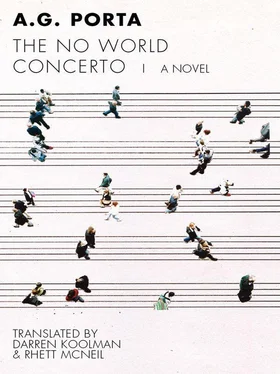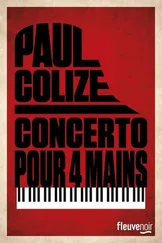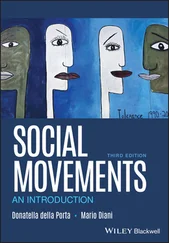The screenwriter goes over the scene in which the girl discovers the guy in the classically-cut suit is in fact a seriously ill scientist. The girl reads about him in the newspaper as she waits for her mother to collect her for the interview. It seems a little different compared to the article she saved in her diary, so she goes to a kiosk to check what the other newspapers have to say. Her mind races as she riffles through the pages, wondering what this guy was doing with her father just before he fell ill. She doesn’t expect the newspapers will tell her. Each newspaper sketches its own portrait of the man, although they all agree in one respect, that he’s an old eccentric who, in recent years, had withdrawn almost completely from public life. The girl doesn’t remember her article saying this. In fact, she thinks it said quite the reverse. The screenwriter senses the girl’s fascination with the man: a fascination they share, although their thoughts hardly converge in any other way. The scene then blurs into three or four parts he can’t quite distinguish. He looks at his watch. It’s late, and he’s sleepy. What’s the girl doing right now? Perhaps sitting beside her mother in a taxi; or beside the young conductor in that small theater, wondering what would’ve become of them had twelve-tone music never been invented; or beside the brilliant composer, who repeats the same answer he already gave to the question, whatever it was. She could even be helping to train the new conquest, demonstrating for her on the piano in exchange for answers to personal questions. But whatever it is she happens to be doing, her thoughts are the same, for she’s only thinking about those newspaper articles, and the strange feeling that’s suddenly come over her. She used to unload her agitation on the young conductor and brilliant composer, but now that those relationships have ended, she feels alone, and has no one else in the world to confide in. She imagines being strong, capable of creating layers of protection against the unknown entities lurking in the shadows, entities she senses could leap out at any moment. She feels uncomfortable, has lost her focus. The church is full, as usual, but she doesn’t see anyone she knows. It’s a magnificent church, with a high belfry for communicating with other civilizations, although it looks far less imposing compared with the large cathedral towers. For an instant during her recital, she thinks she sees her cousin Dedalus flashing by, like lightning that was absorbed into the crowd, and she wonders whether she just imagined it, although she does remember inviting him on the day they met. She searches for her mother’s face in the audience, who might be able to corroborate what she saw, but she can’t find her in any of the tiers. Her thoughts turn again to the gravely ill scientist. The articles stress his condition has worsened, which means he must have already been sick when she met him. She’d have liked to talk to him about the cathedrals transmitting and receiving messages to and from space. One of the articles speculated on why he retired from public life and abandoned his cutting-edge research to become a recluse. Something prevents her from talking to her father about it — a gut feeling, or something like it, tells her not to do so. Others obtain an advantage over you if they know too much about what goes on in your life. She’ll admit to any foibles he might deem typical of a teenager, and update him on the musical career he shows little interest in, but nothing more. There are no such things as coincidences, she says to herself, not knowing why she’s said it again: a proposition that’s become a platitude.
He can no longer stand the solitude. Once again, it seems, the girl won’t be coming, and even the disturbing dream he had only hours before has now left him. She thinks they’re following her, so she must be breaking her usual routines. She’s probably sorry she can’t make it. After primping himself in front of the mirror, he takes his jacket out of the closet. He’d feel naked without it. It’s a sultry night, perhaps too warm to go cruising, but his desire burns even hotter. As he closes the door behind him, he smiles to himself. They say old age vitiates desire. His whole life he’s been hearing such lies. As the elevator descends, he taps the floor with small impatient strokes, thinking he’d strike anyone in the street who got in his way. He’ll restrain himself, though, because of his cultivation, his manners, his savoir-faire: the kinds of things they used to teach in school, which no one teaches anymore. Or perhaps the real reason he’ll restrain himself is fear. He walks in the direction of the boulevards until he manages to hail a taxi, telling the driver to take him to the street where he first met the black prostitute. A few meters above the sex shop, he finds her leaning at the entrance to the stairway, as if she’s been waiting for him. He greets her with a hug, tells her how miserable his life is, that he no longer understands the world, and that the world no longer understands him. She strokes his hair, and asks him about his work. She’s asked him the same question before, but it doesn’t matter, she knows why he came: to be disburdened, to be allowed to repeat the same story as before about himself, the same rant about the rest of the world, until he’s satisfied, or until she can’t bear to listen anymore. After telling her how he became a screenwriter, he starts talking about the old days, how they’re invariably better than the new ones. Then he talks about the screenplay he’s writing. Do you know why I called it No World ? She has no idea. Because the world we’re living in isn’t real. It doesn’t exist. You and I don’t exist. Is that what you mean by No World? she asks. But the screenwriter isn’t listening to her, or perhaps he doesn’t want to be waylaid during a monologue, or perhaps he’s still trying to figure out why the girl apposes those two words, what exactly she’s referring to. So he ignores the prostitute’s question because he doesn’t know the answer himself. And it doesn’t end there, he says, continuing as if she’d never asked it, there’s also the matter of truth and falsity. Let’s imagine nothing around us is real. The screenwriter pauses, allowing her time to conceive of the scenario, but the prostitute instead takes advantage of the pause to ask him if No World is the definitive title for his movie. He nods his head, says it’s a title he borrowed, but then insists nothing is definitive in this life. She keens pityingly, combing his gray hair with her fingers.
The screenwriter thinks, or perhaps he’s hoping against hope, that if he’s more prudent with his spending, he’ll manage to struggle out of the financial quandary he’s in. In any case, a creditable screenwriter ought to know, or at least have a good idea, how to finish the story he proposes to write. He pays for breakfast and takes a long detour to the river on his way back to the hotel. Today’s a good day, even his limp has relented somewhat, and he feels he can walk any distance with ease. He buys fruit, cheese, and hamburger buns, food that’s easy to prepare, in case he doesn’t feel like leaving his room again later when he’s hungry. The newspapers are piling up on the bed. On their front pages, he’s written notes such as: today, it rained; or, the heat was unbearable today; or, interesting article today on the star of that soccer team. He looks out the window at the building opposite, at the floor exactly level with his. It seems like an eternity since the woman showed her face. He’s not happy with the phrase, “showed her face,” and tries to think of another. “Made an appearance,” perhaps. Today’s newspaper has an article about the trafficking of radioactive material, another on the soccer star, who still hasn’t said when he’ll be returning to training, and another on the worst terrorist in history, whose lawyers have filed a lawsuit against the government for kidnapping their client on territory outside their jurisdiction. The screenwriter reads a long article about the general who succeeded in capturing him, the head of the team of lawyers who’ll be defending him, and the judge who — assuming he’s found guilty — will be sentencing him. The general is depicted as an agent provocateur, the perfect spy, a person no one’s succeeded in photographing. The screenwriter puts this newspaper on top of the pile and lights a cigarette. The kind of work the girl’s father might do, he says. He imagines him in the hotel in front of the Grand Central Station, doing whatever it is he does there — spying, monitoring. The screenwriter’s beating around the bush. But the girl’s notes aren’t very clear about it either. Perhaps her father’s been especially cautious around her, concealed his activities well, or perhaps she knows all and doesn’t want anyone else to. He exhales some smoke while standing up, goes to the bedside table, and picks up the receiver. He dials the producer’s number, listens to the rings, not counting, but murmuring to himself: money; another advance; I’d appreciate whatever you can give. Not asking for a specific amount makes his situation seem more desperate. Oh yes, it’s a magnificent screenplay, reminiscent of those legendary scripts written during the golden age. Perhaps he shouldn’t boast, he thinks while waiting for the phone to cut out — these aren’t the words the producer wants to hear. No one believes in magnificent screenplays anymore. Of course he wants a perfect script, but “perfect” for the producer doesn’t mean a work of art. It means a work that has all the qualities that betoken commercial success. That’s what people today seem to mean by words like “great,” “perfect,” “magnificent,” etc. And they all mean the same thing to the producer. So if the script is described as magnificent, it had better be with this understanding in mind. The screenwriter didn’t notice the phone cutting out, or the fact he’s gone on holding the phone notwithstanding. He hangs up and dials his home number. Fucking August, he complains. Like a Sunday protracted to the length of a whole month. A month when the world seems to come to a standstill, when no one does anything productive, when even eating may be thought a supererogation. If I hate Sundays, I fucking hate Augusts, he says while hanging up the telephone, and angrily crushing his cigarette in the ashtray.
Читать дальше












